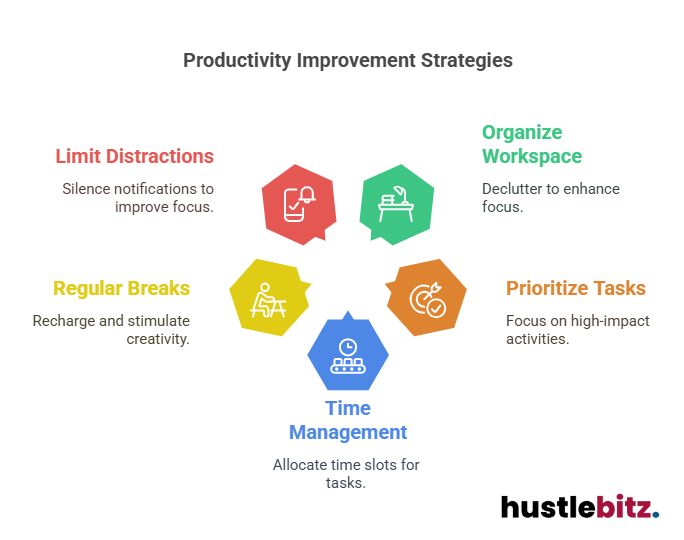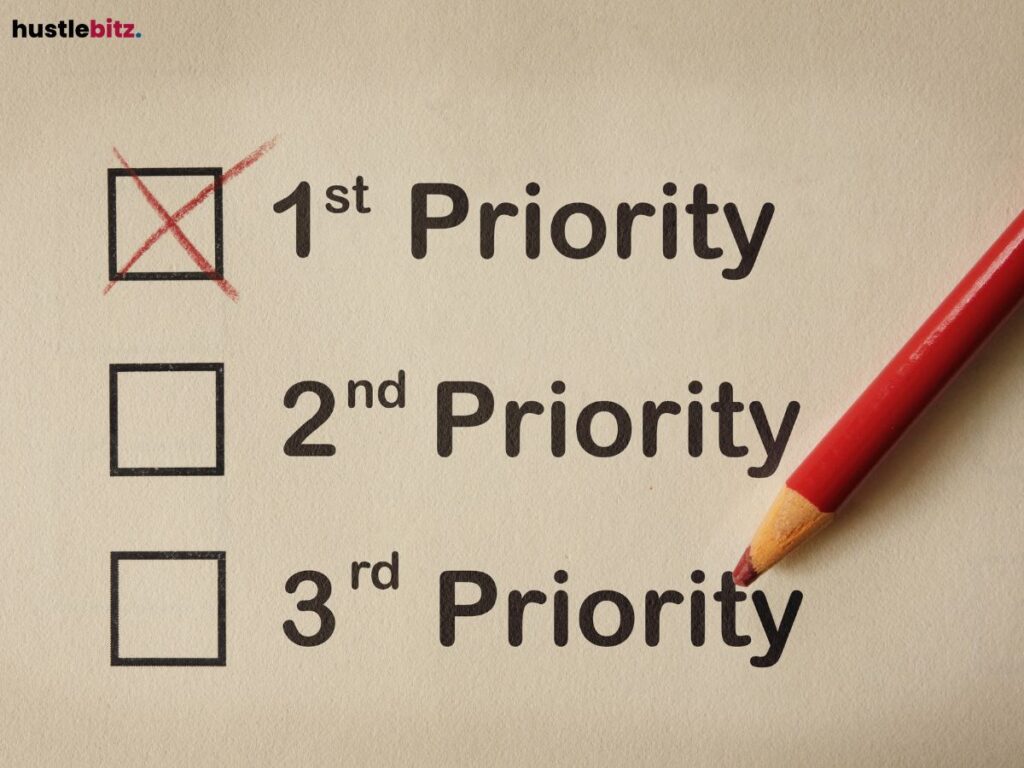To boost productivity, it’s vital to adopt essential work habits. Start by organizing your workspace to minimize distractions and foster focus. Prioritize tasks using a matrix to tackle urgent and important items first. Implement effective time management techniques like time blocking and task batching for enhanced efficiency. Mindful task execution can elevate your awareness and performance, while regular breaks prevent burnout and rejuvenate your energy. Finally, limit distractions through digital detoxes and manage noise levels. Establishing a healthy work-life balance further enhances productivity. Discovering more about these practices will undoubtedly elevate your work efficiency.
Key Takeaways
- Organize Your Workspace: A clutter-free and ergonomic workspace enhances focus and minimizes distractions, boosting overall productivity.
- Prioritize Tasks Effectively: Use a prioritization matrix to identify urgent and important tasks, ensuring you focus on high-impact activities.
- Implement Time Management Techniques: Utilize time blocking and the Pomodoro technique to allocate specific time slots for tasks, maintaining sustained focus and energy.
- Take Regular Breaks: Incorporate intentional pauses to recharge and stimulate creativity, preventing burnout and enhancing overall work performance.
- Limit Digital Distractions: Engage in a digital detox by silencing notifications and designating phone-free times to reclaim focus and improve effectiveness.

Organize Your Workspace
An organized workspace is essential for enhancing focus and efficiency, as it minimizes distractions and fosters a conducive environment for productivity. By prioritizing workspace aesthetics, individuals can create an inviting atmosphere that motivates and inspires. Implementing a minimalistic design not only simplifies the visual landscape but also aids in digital decluttering, ensuring that digital tools and files are streamlined for immediate access.
To achieve an ergonomic setup, it is crucial to arrange essential tools within arm’s reach, promoting comfort and reducing strain. Personalized organization systems, such as labeled storage and dedicated spaces for specific tasks, enhance the ability to locate items swiftly, further optimizing time management. Efficient layouts are integral in crafting a functional workspace; consider the flow of work and how various elements interact within the environment.
Color psychology plays a significant role in influencing mood and productivity. Selecting colors that align with personal preferences can evoke the desired emotional response, whether it be increasing focus or fostering creativity. Additionally, incorporating ambient lighting is vital, as it can transform a workspace into a more stimulating or calming environment, depending on the task at hand.
Prioritize Key Tasks

Effectively prioritizing key tasks is fundamental to maintaining productivity, especially in a well-organized workspace that minimizes distractions and facilitates focus. A structured approach to task management can significantly enhance your ability to achieve desired outcomes.
Begin by conducting a thorough workload assessment, which allows you to identify tasks based on their urgency and importance. This assessment serves as the foundation for effective daily planning and goal setting.
Employing a prioritization matrix can help you categorize tasks into quadrants, ensuring that you focus on those that yield the highest impact. While managing your tasks, maintain an awareness of deadlines to avoid last-minute scrambles. Additionally, adopt an essentialism mindset, concentrating on what truly matters and eliminating unnecessary tasks that drain your resources.
Task delegation is also a critical aspect of prioritization. By recognizing when to delegate tasks, you can free up time to focus on high-priority items, thereby increasing your overall productivity. Utilize productivity tools that facilitate progress tracking, enabling you to monitor the completion of tasks efficiently.
As you refine your approach to prioritizing key tasks, remember that flexibility is essential. Reassess your priorities regularly to adapt to changing circumstances, ensuring that your focus remains aligned with your overarching goals.
Effective Time Management

Mastering effective time management is essential for maximizing productivity and ensuring that tasks are completed efficiently within set deadlines. One of the most powerful strategies for achieving this is time blocking, which involves allocating specific time slots for particular tasks. By defining clear boundaries around your work, you can minimize distractions and maintain focus during critical phases of your workflow.
Additionally, task batching—grouping similar tasks together—can significantly enhance efficiency. This method reduces context-switching, enabling you to work more effectively during your peak energy phases. Coupled with robust goal setting, these techniques provide a structured approach to deadline management, allowing you to track progress and adapt as needed.
Utilizing productivity tools can further streamline your efforts. Tools such as digital calendars and project management software support various scheduling methods, ensuring that your plan aligns with your objectives. Implementing efficiency techniques such as the Pomodoro Technique can optimize focus and encourage short breaks, which enhances concentration over extended periods.
Moreover, understanding your energy peaks allows for better allocation of high-priority tasks during times when you are most alert. By aligning your workload with your natural rhythms, you can significantly boost your overall productivity.
Mindful Task Execution

Engaging in mindful task execution fosters a heightened level of awareness and focus, enabling individuals to complete their work with intention and clarity. By employing mindfulness techniques, professionals can cultivate an environment conducive to productivity. This begins with task visualization, where one mentally outlines the steps necessary for successful completion, thereby enhancing focused attention on the task at hand.
Effective energy management is also crucial; recognizing when to work at peak capacity allows for optimal performance. Incorporating positive affirmations can further bolster confidence, leading to enhanced output and persistence in the face of challenges. Additionally, implementing intentional pauses during work can serve as a powerful tool for stress reduction. These moments allow for reflection, recharging energy levels, and maintaining cognitive flow.
Adaptive strategies, such as adjusting one’s approach based on ongoing feedback, empower individuals to remain flexible in their execution of tasks. This reflective practice not only promotes continuous improvement but also reinforces a growth mindset. By acknowledging successes and areas for development, professionals can further refine their task execution process.
Ultimately, mastering mindful task execution equips individuals with the ability to navigate their workload with greater control and effectiveness. As they engage in these practices, they foster an environment where productivity thrives, resulting in a more accomplished and satisfying work experience. Embracing these principles can lead to sustained success and a profound impact on professional endeavors.
Limit Distractions

To enhance productivity, it is essential to identify and limit distractions in the workplace, creating an environment that fosters concentration and focus. Distractions can severely diminish your attention span and derail your workflow. Implementing strict controls can empower you to reclaim your time and improve your effectiveness.
Consider the following strategies:
- Digital Detox: Set aside specific times to unplug from technology. This will help you maintain a healthy relationship with your devices, allowing you to focus more intently on your tasks.
- Noise Reduction: Invest in noise-canceling headphones or create a quiet workspace to minimize auditory distractions. A focused environment is critical for mental clarity.
- Phone Management: Establish technology boundaries by silencing notifications and designating phone-free periods. This practice curbs the impulse to check messages and social media, allowing you to concentrate better.
- Visual Clutter: Keep your workspace organized to reduce visual distractions. An orderly environment promotes mindfulness practices, enhancing your ability to focus on the task at hand.
Take Regular Breaks
Taking regular breaks is essential for maintaining sustained productivity and preventing burnout throughout the workday. The strategic implementation of break frequency can significantly enhance your overall work performance. By interspersing periods of focused work with intentional breaks, you create productivity cycles that allow for mental refreshment and energy renewal.
Engaging in physical activity during these breaks can further amplify the benefits. Simple stretching or a brisk walk can stimulate blood circulation, leading to enhanced focus and motivation boost. Moreover, these moments away from your desk can serve as vital opportunities for creativity bursts, allowing your mind to wander and generate innovative ideas that may otherwise remain dormant during prolonged tasks.
Incorporating stress relief techniques, such as deep breathing or mindfulness exercises, during breaks can also contribute to a healthier state of mind. This not only aids in burnout prevention but also fosters a more resilient approach to challenges. When you return to your tasks, the clarity gained from these intervals will enhance your efficiency and effectiveness, ultimately leading to improved performance.
To maximize the advantages of taking regular breaks, consider scheduling them at intervals that suit your work rhythm. Whether it’s every hour or after completing specific tasks, the key is consistency. By prioritizing these breaks, you empower yourself to maintain control over your productivity, ensuring that you remain focused and engaged throughout the day.
Maintain Work-Life Balance

Maintaining a healthy work-life balance is crucial for optimizing overall productivity and personal well-being. In today’s fast-paced environment, achieving work-life harmony is more essential than ever. By establishing clear personal boundaries and integrating effective stress management practices, you can enhance your mental health and overall productivity.
Here are four strategies to help you maintain this balance:
- Set Flexible Hours: Allow yourself the freedom to adjust your work schedule as needed. This enables you to prioritize family time and leisure activities without compromising your workload.
- Prioritize Self-Care Practices: Engage in activities that rejuvenate your mind and body. Whether it’s exercise, meditation, or hobbies, these practices foster resilience against stress and enhance focus.
- Utilize Productivity Tools: Leverage technology to streamline your workflow. Productivity tools can help you manage tasks efficiently, allowing more time for personal interests and family engagements.
- Embrace Remote Work: If feasible, take advantage of remote work opportunities. This flexibility can significantly improve your work-life harmony, making it easier to balance professional responsibilities with personal commitments.
Final Thoughts
Adopting essential work habits is key to improving productivity and achieving balance in your professional life. By organizing your workspace, prioritizing tasks, managing time effectively, and incorporating mindful breaks, you can create an environment that fosters focus and efficiency. Limiting distractions and maintaining a healthy work-life balance further enhances your capacity to perform at your best. With these habits in place, you’ll not only accomplish more but also sustain your energy and well-being, leading to long-term success and satisfaction in your work.




